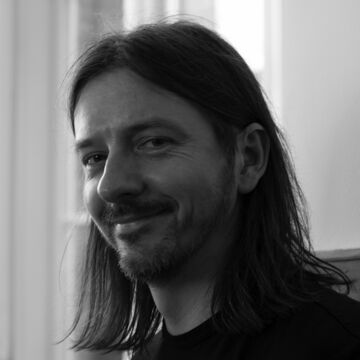

Piotr Michura
Associate Professor
Contact
Bio
Positions: Chair, Associate Professor, Visual Communication Design; previous appointment – Associate Professor, Faculty of Industrial Design, Academy of Fine Arts in Krakow, Poland – over 20 years of teaching experience. Education: PhD in Design (2012), MFA in Visual Communication Design (2001), Academy of Fine Arts in Krakow, Poland; MDes in Visual Communication Design (2008), Department of Art and Design, University of Alberta, Edmonton, Canada – analog and digital media; woodcut and serigraphy, letterpress, typography and book design, information design, text and information visualization; user-centered design, research through design. Research: PhD research on experimental text visualizations for interaction with electronic documents for humanities researchers (digital humanities); information design, text and information visualization; “conversation modeling" – screen-based and tangible interfaces for conversations; intersection of systems theory, second-order cybernetics, and design. Research Collaborations: Institute of Design IIT in Chicago (2012, 2013, 2014, 2015 - Fulbright Award); Mount Royal University in Calgary, Canada (2013); Universidade do Vale do Rio dos Sinos in Porto Alegre, Brasil (2015); University of Illinois in Urbana-Champaign (2017); international research projects in digital humanities, NORA (2006-2007), MONK (2007-2008), PlotViz (2010-2013), INKE (2010-2015). Book Chapters: Stories and Conversations in the Smart City, co-authored with G. Derksen and S. Ruecker, in “Smart Cities as Democratic Ecologies” edited by D. Araya; two chapters Wladyslaw Pluta and Ryszard Otręba, in “VeryGraphic. Polish Graphic Designers of the 20th Century” edited by J. Mrowczyk; Slot Machines, Graphs, and Radar Screens: Prototyping List-based Literary Research Tools, co-authored with S. Ruecker, M. Radzikowska, and C. Fiorentino, in: “The Charm of a List” edited by L. Dolezalova. Journal Articles: Modeling Design Conversation, co-authored with C. Scaletsky, Ch. Del Gaudio, F. Campelo Xavier da Costa, G. Derksen, G. Corrê Meyer, J. de la Rosa, and S. Ruecker, in Cuaderno 69; Documenting Subjective Interpretations of Illustrated Book Covers for Lewis Carroll’s Alice’s Adventures in Wonderland, co-authored with S. Ruecker, M. Radzikowska, T. Dobson, G. Derksen and the INKE Research Group, in Scholarly and Research Communication 5(2); Interactive Visualizations of Plot in Fiction, co-authored with T. Dobson, S. Ruecker, M. Brown, and O. Rodriguez, in Visible Language 45. Conference Papers: Conference on Anticipation (2015, 2022); Relating Systems Thinking and Design – RSD6 (2017); Design Research Society – DRS (2016); Congress of International Association of Societies of Design Research – IASDR (2015); Canadian Society for Digital Humanities CSDH/SCHN (2012, 2013); Digital Humanities (2011, 2012, 2013, 2016); Society for Digital Humanities – SDH/SEMI (2007, 2009). Commissions: National Museum in Krakow, Dr. Tytus Chalubinski Tatra Museum in Zakopane, Seweryn Udziela Ethnographic Museum in Krakow. Memberships: International Institute for Information Design (IIID), regional representative for Poland; Systemic Design Association (SDA). Awards: Fulbright Senior Advanced Research Award (2015) – Institute of Design IIT Chicago; “Sybilla 2014" Museum Event of the Year Award by Polish National Institute for Museums and Public Collections; “Young Poland" Scholarship (2008); Polish Ministry of Culture and National Heritage Scholarship (2007). Member of journal editorial team: Co-founder and editor of Polish design journal Formy, www.formy.xyz.